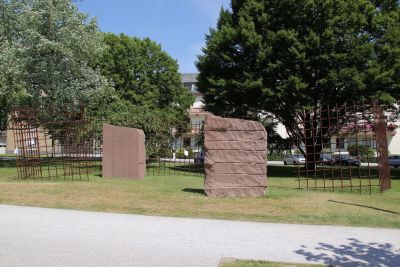Polish letters from the pre and post-war years and from during the war, taking Rhineland-Palatinate as an example
Sprendlingen
In Sprendlingen, Eleonore Renner, who remembers the Polish forced labourers in Sprendlingen (Rhine-Hesse) and at her home from her childhood, still keeps a letter from Kazimierz Wojciechowski, who worked as a forced labourer on Eleonore Renner’s parents’ farm during the war. The letter dated 29 December 1947 shows just what a heartfelt relationship had developed between the family members and Kazimierz Wojciechowski during the war:
“Fulda from the Bleidorn Barracks Block E Pokoj 40
To:
French Zone
Philipp Schnell
Sprendlingen, Kr. Bingen/Rhein
Schäfergasse 5
Fulda, 29/12/47
Dear Schnell Family!
I would like to thank you very much for your lovely letter and for enclosing a banknote, I was very happy and have seen from your letter that you are still all very well. Josef has been home for a long time, I’m the only one in Fulda, and I don’t know yet how long we can come any way back to the company [Translator’s note: the German is not always clearly expressed]. And a question for you, how is your daughter and Hanna and Mrs Renne[r] Mrs Lina. Are they all still in good health, which I can also say about me. Is Philipp already home or not yet. How was Christmas for you. I can say that I really enjoyed it. I got your lovely lines, but unfortunately I can’t read them, I had them translated, in the next letter I would ask if you could write in Latin. It is better when one reads one’s letter alone. When I get holiday next year, I will come to you whether the vineyards are all OK.
So will close to get an answer soon because we are not here for much longer
Warm regards
Your Kazimierz
I wish you all a happy and healthy New Year.”
The letter is thus also an example of how the Nazi regime, with its criminal decrees which discriminated against the Polish forced labourers, with the aim of exploiting their workforce as much as possible and in so doing of minimising contact between Germans and Poles, did not succeed, that sympathies crystallised between Germans and Poles which also endured in the new reality after the German surrender.
The groups of letters and postcards mentioned represent an important source of Polish imprints in Germany which help in the investigation of the German-Polish relationship. Finding them and evaluating them in the context of extensive research, is a rewarding challenge.
Christof Schimsheimer, November 2021














